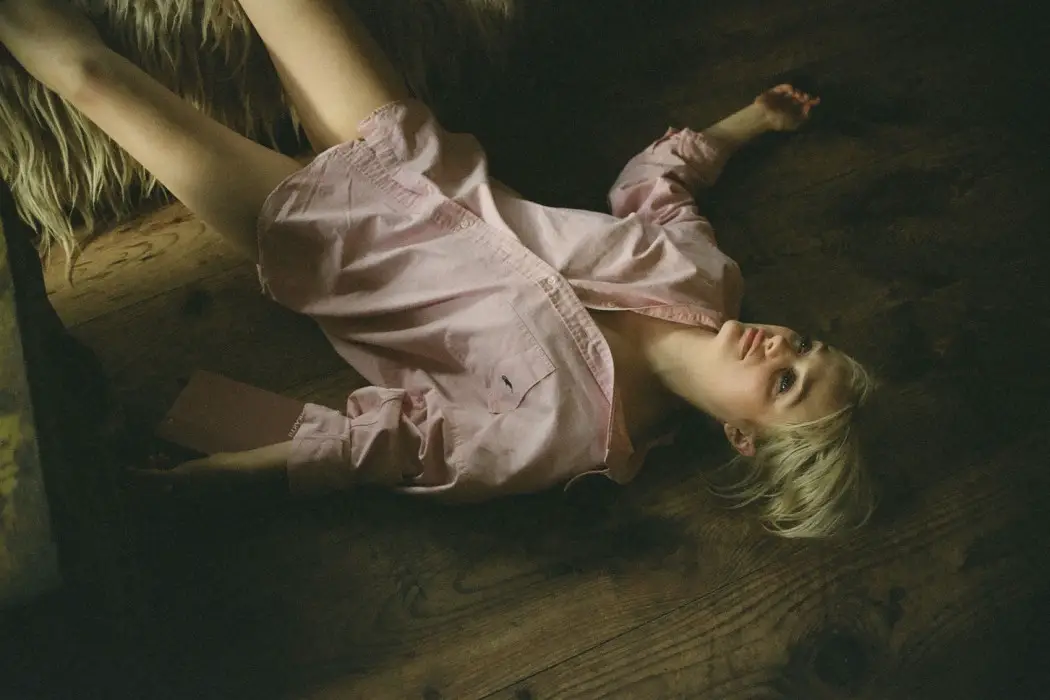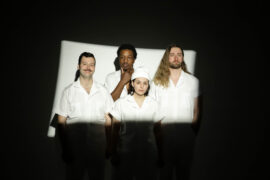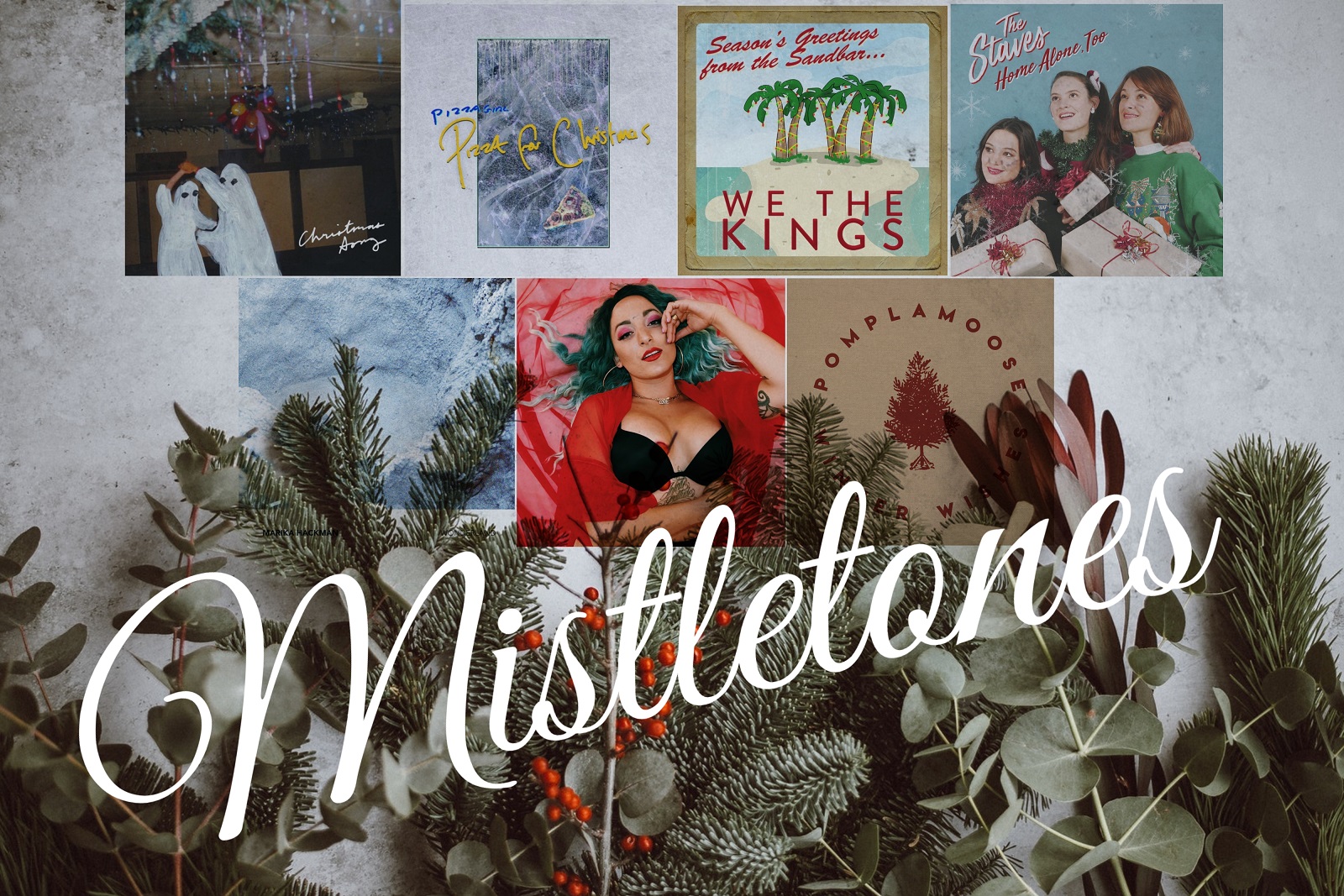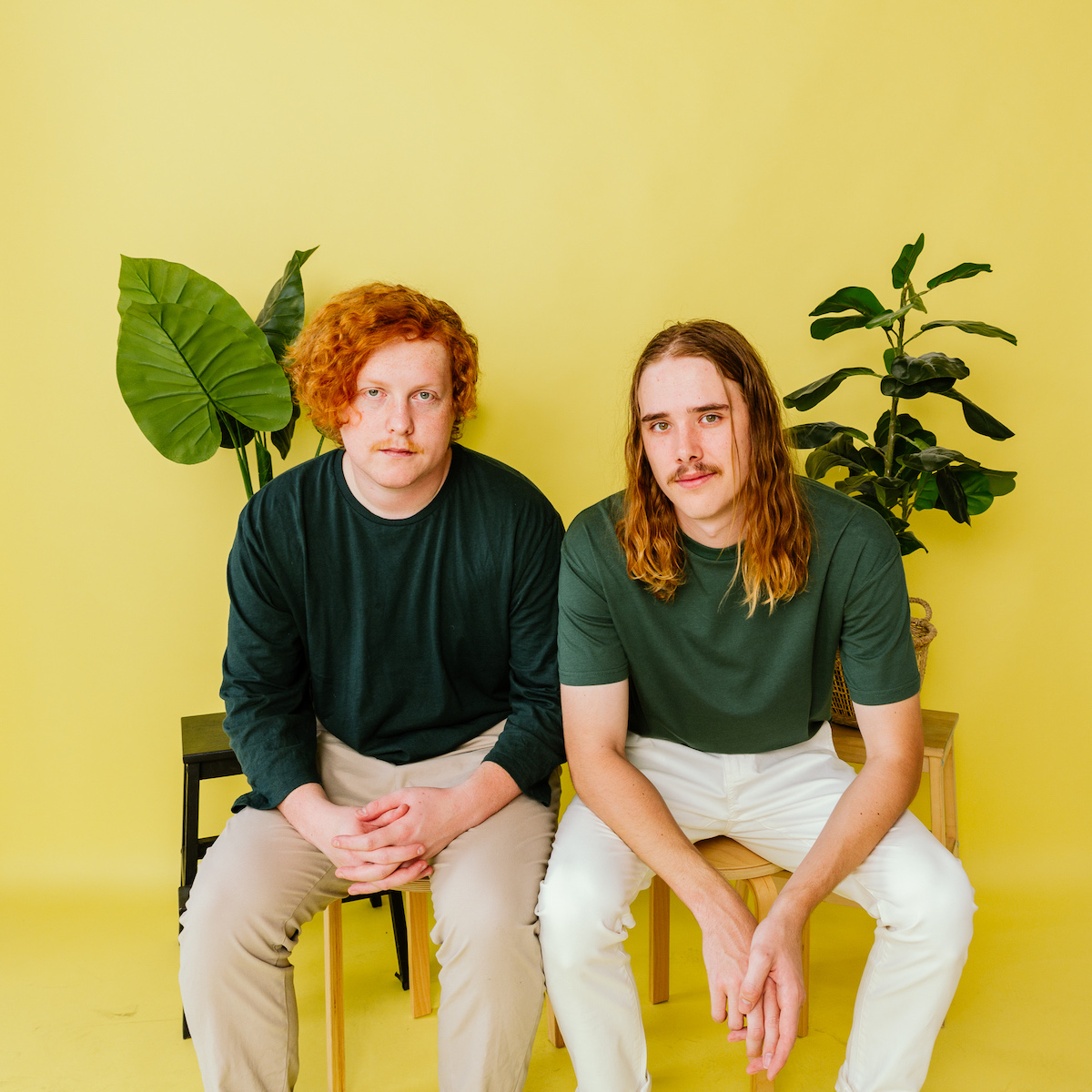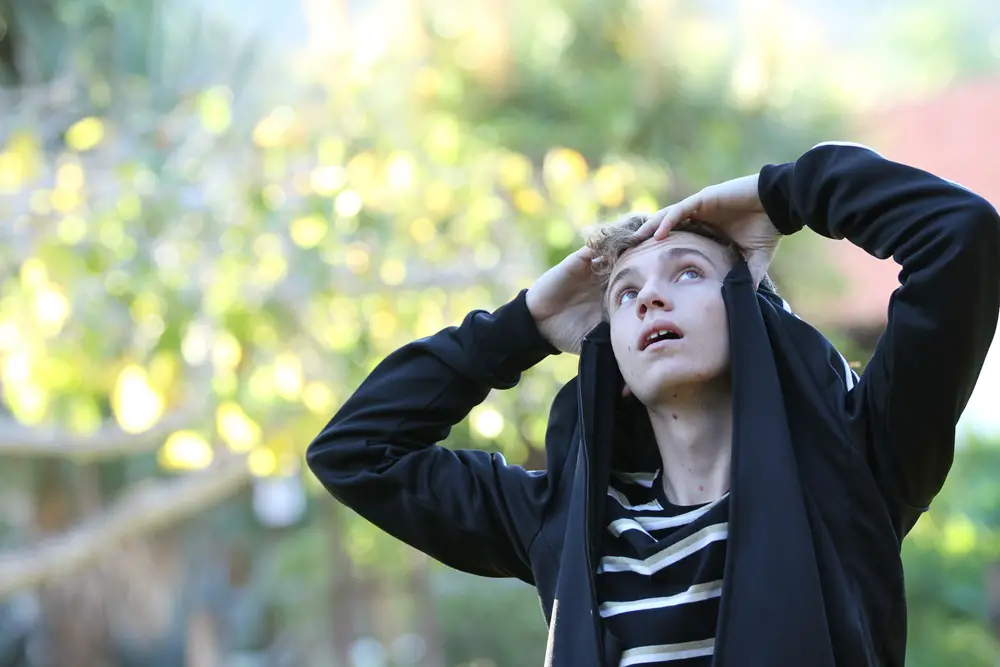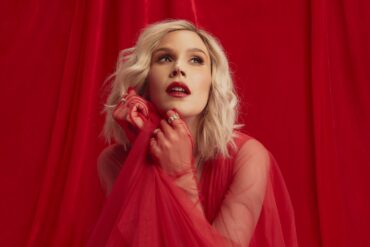Atwood Magazine speaks to musician and actress Alison Sudol about her return to music, her Moon EP, the company she founded with manager Adrienne Butcher, as well as her role as Queenie Goldstein in the Fantastic Beasts saga.
— —
“Can you hear me now?” is the question that opens Alison Sudol’s new EP, Moon, the first one the musician and actress releases under her own name. Sudol first made music under the alias A Fine Frenzy, with which she found considerable success, but after a six-year long break, she’s back to music, now releasing it under her own name. Moon sounds like someone handing you their heart on a platter, giving you access to all its deepest corners, showing you all you’ve missed while they were away – the struggle, the heartbreak, the joy, the newfound confidence. It embodies incredible vulnerability while also taking you in a journey of rebirth and rebuilding, which ends in a serene and confident sentence: “thank you“. There’s a lot of beauty to be found in Sudol’s EP, it’s the kind of project you’ll want to listen to several times just to spot all its layers and bask in all its wonder. Just like the best works of art, Sudol has crafted a body of work that is capable of moulding itself to your life, taking on new meaning and new life as the listener goes through different moments in life.

With Moon, Sudol shows the power in finding your voice again and the beauty of honesty – she’s honest in her lyrics, honest in the wonderfully magical and undefinable kind of music she makes, and honest in admitting that she needed to do this in her own time. It is only appropriate that someone capable of creating such a transcendental piece of work also found actual magic in her life, and nowadays you can also find Sudol in the big screen giving life to Queenie Goldstein, a witch who has everyone’s good intentions at heart, in the Fantastic Beasts and Where to Find Them saga. Atwood Magazine spoke to Sudol about her return to music, the company she founded with manager Adrienne Butcher, as well as her role of Queenie Goldstein in the Fantastic Beasts saga.
Moon EP – Alison Sudol
A CONVERSATION WITH ALISON SUDOL
Atwood Magazine: On the letter you posted on your website you say that you spent so long hiding from mental health, but now it seems to be the only thing you want to talk about. What do you think happened for you to want to speak about it so much, and so openly?
Alison Sudol: I needed to come back to music, my throat actually ached from not singing, and I felt that the only way I could come back was if I came clean about why I stopped in the first place. I also thought, maybe if I hadn’t felt so ashamed of how I felt, I might have asked for help years before, and maybe I might save someone else those years of secrecy and private turmoil if they knew they weren’t alone. I wrote what felt like sixty drafts of that letter, trying to figure out what to say, and how to say it. It kept me up at night, drove me pretty crazy, honestly, but the one thing I knew was that I had to do it.
How did the decision to start a company come about? Why did you feel it was the moment for you to not only return to music, but also create a platform for others to work on and expose their art and creativity?
Alison Sudol: My long-time manager, Adrienne Butcher, and I have been working together since before One Cell in the Sea came out. She and I have been through a lot, we’ve basically grown up together in this business, and when it came time to find a label to put Moon out on, we knew exactly what we needed. I personally financed Moon from the ground up, and all we really needed was a team to help us deliver it, but most labels aren’t set up like that. Also, frankly, we were having trouble finding people who responded to the music from a gut level- there was a lot of, “Well, what box does this fit in?”- which is the kind of antiquated thinking I had thought for sure must have gone extinct in the time that I had stepped away from the music business, but unfortunately it’s alive and kicking still. That approach is all head, very little heart, even less imagination – I don’t really get how it got so prevalent in the business that makes music but anyways, for an artist like me, it’s not a great place to be creative. I confuse people. Besides, there was the complication of balancing the two careers, music and acting, the fact that we really wanted to handpick every person that we worked with, so we could have a team with the same values as us, which is pretty much impossible in a pre-packaged label environment. We wanted to have our budgets be transparent, so we knew exactly where our money was going and why, and our approach fluid so we could work with what the music called for as opposed to being bound to the “way things are done”. For example, we broke what was initially one record into two EPs, Moon and Moonlite, because I felt like the flow made more sense that way. Plus, we wanted to find a way to release music that could be healthy, mentally and physically, and with as little environmental impact as possible… We decided to create Hearth as a way to explore all of this. Our team is a wonderful group of people – everyone cares, everyone is highly creative and intelligent, and it’s exciting to watch everyone grow into their roles as the company roots and expands. I’m the guinea pig, and then hopefully one day we’ll be able to release other artists as well.
With your letter, it feels like your biggest intent with your return to music and the creation of your company is to create a safe space for people - for them to be creative, appreciate and consume art, be inspired, even for them to struggle and know it’s fine that they’re struggling - is that right? If so, how do you hope to translate this feeling onto live shows?
Alison Sudol: Yes, totally. Honestly, it’s a work in progress. It’s been so long since I’ve toured, so I think some of this will just develop naturally as I go back on the road again, because it’s ingrained in who I am. The cool thing about Hearth is that we’re allowing ourselves to explore what works and doesn’t work through doing it – you can plan yourself blue to the face, but there’s a certain kind of magic that happens in trying stuff out that can’t really be discovered any other way. I think we’ll just play and I’ll talk between songs and meet people afterwards and hopefully get a sense of what is needed that way.
Does it feel any different releasing music under your own name, rather than an alias, now?
Alison Sudol: Yeah, very. I can’t f*** this up, now, because I don’t have another name.

The Moon EP feels very intimate, especially with how it starts in “Escape the Blade”, it feels like you’re walking into a room and just seeing a snapshot of you playing the piano and singing. The lyrics of that song also seem like a self-reflection, like you’re looking at yourself and how you’ve grown and developed over a period of time, is that where the song came from?
Alison Sudol: Thank you, that’s a lovely image. Yeah. It was an intense time, back then, I was grieving and lost and trying to find a way through it. Even though I was struggling, there was a sense of rebirth happening, that the destruction of one life was creating space for a new one to emerge, and there was a lot of beauty in that. I guess I had to hit bottom to discover how resilient and alive I actually was, and how fiercely I was willing to protect that part of myself, when it came down to it.
“Lonely Love” on the other hand is much more expansive, the song is livelier and your voice is louder and the song just sounds like a bigger moment. That being said, the lyrics are extremely sad. What do you think the contrast between a happier melody and sad lyrics can achieve, especially when the listener is happy dancing around and then realises what they’re singing along to and are like “Oh…”?
Alison Sudol: Hahah… “Oh…” I guess, hopefully it can offer one of those great moments I’ve had many times, where you’re going through something and you’re listening to a song and it hits you where it hurts and you can cry and dance at the same time. That’s the goal, I guess.
On “It’s Really Raining” we see the contrast between lyrics and music again, but I feel like these lyrics are so vulnerable, especially since the song is like a conversation between you and someone else. What inspired the song?
Alison Sudol: A good hard look at my behavior. Ha.
The EP ends with “The Quickening”, which sounds like acceptance and gratitude, and when we compare it to “Escape the Blade” the EP’s journey becomes clear, and it seems like we’ve seen you grow stronger throughout the five songs. Why did you choose this one as the closing track? Also, there’s something very symbolic and special about ending a song and a project with “thank you”, why did you choose to do this, and what are you saying thank you for?
Alison Sudol: Thank you! Ha. Oh dear. I like sequencing albums so you go through a journey when you listen. It’s kind of cinematic for me, in that way. I chose “The Quickening” as the ending because the things I went through along the way, writing these songs (with Ali C.) brought me through some rough stuff, and at the end my deadened, numbed out, over-hurt heart felt like it was starting to open again. I genuinely believe that the music was key in leading me there. There was so much to be thankful for – thankful for the beautiful collaborator I found in Ali C, thankful to Adrienne, thankful to my friends that walked with me through all of this as I was writing, both in person and through the miracle that is FaceTime, thankful to certain male somebodies who reminded me I could feel a flutter for another human again… Thankful to be able to write about it all.
Watch: “Escape the Blade” – Alison Sudol
The visuals for “Escape the Blade” are very nature based and naturalistic and simple, while the ones for “Moon” are little more surreal, how did you decide which direction to go in for each of the videos?
Alison Sudol: For “Escape the Blade”, it was somewhat accidental – Sam (Samuel Aaron Bennett) and I shot that footage when we were in Hawaii and we didn’t necessarily know what we were going to use it for – it just happened that the imagery and the music fell together in a way that made perfect sense. Especially the bamboo forest and the felled trees. That was quite exciting, seeing it all come together. As for “Moon”, I had the idea for that video and knew there had to be a somewhat surreal aspect to it, given the subject matter. But there was also something deeply feminine about it, and I wanted to explore that as well.
The video for “Moon”, which you directed, has this very symbolic scene at the end with the stripping away of the astronaut suit and the exchange for a dress. Can you talk to me more about the idea behind the video and what it was like to direct it?
Alison Sudol: I’ve really struggled with isolation, my whole life, and disassociation with my body. I’ve felt so alone, even when there were people trying to connect with me, I didn’t really know how to reach out beyond my pain and be warmed by love. But then my heart got broken, wide open, and despite the fact that it hurt like hell for a long time, suddenly there was room for love to pour in. My isolation couldn’t hold up, I needed to ask for help, and the moment I did, help was everywhere I looked. I learned the true value of female support, and how much fortitude, beauty, and inspiration it could provide. All the women in the video have been a huge part of my life in one way or another- my grandmother, my godmother, my nanny from when I was 3 who taught me to love nature, whom I hadn’t seen in nearly 30 years… they flew in from all over, from Seattle, from Northern California, Nashville… It was powerful, to have everyone in the same room, and then to direct them was something beyond. It was an honor to have them trust me enough to put them on camera. It was such a relief in that moment, in so many ways, to take off the suit -symbolically, of course, but also just practically – it’s incredibly hard to direct in a helmet.
Watch: “Moon” – Alison Sudol
I know you’ve talked about how music is much more “life or death” for you, so I wanted to ask how you approach music and acting, and how do each of these art forms give you means to express yourself?
Alison Sudol: They both sort of fall into the life or death category, as I feel like phoning in any kind of artistic anything is way more painful than investing yourself in it. I don’t act too much these days, it’s hard for me to balance both and right now I really need to focus on music after so many years hiding from it. But I think ultimately I do need both – the collaborative nature of acting is really lovely, it has brought a kind of creative structure to my life that has been really helpful for my brain. And it’s nice to step away from telling my own stories and help tell someone else’s. Acting provokes me, pushes me into emotional territory I might be able to avoid if it’s me writing the story and being in control of all the things. My favorite thing is to merge the storytelling aspect with acting – the more I can contribute to who the character is, the more I enjoy it.
With the role of Queenie in Fantastic Beasts you’re given the chance to escape into this world that’s fantastical and beautiful, and so treasured by millions of people around the world. She’s a pretty uplifting character too, she seems to always have everyone’s best intentions at heart. How does it feel to be able to give life to such a character and be part of the world most people dream about living in?
Alison Sudol: I fell in love with Queenie the moment Fiona Weir, the casting director of Beasts, told me about her. It’s surreal, the fact that I have helped develop a character in the Wizarding World, which, like you said, is so treasured by so many. I feel so fortunate to be able to do it, and the group of people I work with are as magical as the world we are a part of. It’s changed my life infinitely for the better.
Do you think acting helped you in the process of releasing new music? Did it give you a newfound confidence and strength in yourself?
Alison Sudol: Absolutely. It got me back on my feet, and fed a part of my confidence that had taken a huge beating, so I could start to work on rebuilding it musically. I’m hugely grateful for it.
You’ll be on the road soon - are you excited? What do you hope people take away from your performances?
Alison Sudol: Yes! So much so! I hope it will soothe people and give them a little of respite from the noise and chaos of everyday life, to quiet down and just feel for a bit…
— —
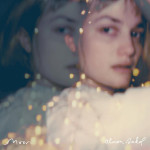
Connect with Alison Sudol on
Facebook, Instagram, Twitter
Discover new music on Atwood Magazine
? © Marlene Marino

